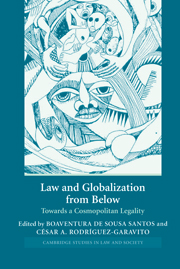Book contents
- Frontmatter
- Contents
- Notes on the contributors
- 1 Law, politics, and the subaltern in counter-hegemonic globalization
- PART ONE LAW AND THE CONSTRUCTION OF A GLOBAL ECONOMY OF SOLIDARITY
- PART TWO TRANSNATIONAL SOCIAL MOVEMENTS AND THE RECONSTRUCTION OF HUMAN RIGHTS
- 8 Limits of law in counter-hegemonic globalization: the Indian Supreme Court and the Narmada Valley struggle
- 9 The Movement of the Landless (MST), juridical field, and legal change in Brazil
- 10 Indigenous rights, transnational activism, and legal mobilization: the struggle of the U'wa people in Colombia
- 11 Defensive and oppositional counter-hegemonic uses of international law: from the International Criminal Court to the common heritage of humankind
- PART THREE LAW AND PARTICIPATORY DEMOCRACY: BETWEEN THE LOCAL AND THE GLOBAL
- Index
- References
11 - Defensive and oppositional counter-hegemonic uses of international law: from the International Criminal Court to the common heritage of humankind
Published online by Cambridge University Press: 07 July 2009
- Frontmatter
- Contents
- Notes on the contributors
- 1 Law, politics, and the subaltern in counter-hegemonic globalization
- PART ONE LAW AND THE CONSTRUCTION OF A GLOBAL ECONOMY OF SOLIDARITY
- PART TWO TRANSNATIONAL SOCIAL MOVEMENTS AND THE RECONSTRUCTION OF HUMAN RIGHTS
- 8 Limits of law in counter-hegemonic globalization: the Indian Supreme Court and the Narmada Valley struggle
- 9 The Movement of the Landless (MST), juridical field, and legal change in Brazil
- 10 Indigenous rights, transnational activism, and legal mobilization: the struggle of the U'wa people in Colombia
- 11 Defensive and oppositional counter-hegemonic uses of international law: from the International Criminal Court to the common heritage of humankind
- PART THREE LAW AND PARTICIPATORY DEMOCRACY: BETWEEN THE LOCAL AND THE GLOBAL
- Index
- References
Summary
INTRODUCTION
Charles Chaumont identified two main features in classical international law – that is, “the set of legal rules and concepts that were predominant before the end of the 1914 war” (Chaumont 1970:343). The first was the “limited participation in the creative process,” meaning the Euro-centric and colonial nature of international law by that time. The second feature was the formalist character of the emergence and enforcement of international legal rules, apparently indifferent to the economic, political, and social contexts within which they were produced. The convergence of these two factors determined, in Chaumont's view, a certain identity of international law: “an abstract system, a set of formal rules disconnected from their concrete contents” (Chaumont 1970:343).
International law was being shaped as a sort of “mix between cynicism and illusionism” (Chaumont 1970:345), within which the attractive force of such broad concepts as solidarity or cooperation would serve mainly as a disguise for the accumulation of violences, injustices, and exploitations that are the true contents of the so-called international society. It should be underlined that this formalist nature – law as the formalization of power relations between strong and weak – has not been abolished together with the overcoming of classical international law as an historical product. In fact, the twentieth century witnessed a progressive replacement of a liberal, decentralized, and oligocratic international order by a social, institutionalized, and democratic one (Pastor 1996:84).
- Type
- Chapter
- Information
- Law and Globalization from BelowTowards a Cosmopolitan Legality, pp. 267 - 280Publisher: Cambridge University PressPrint publication year: 2005
References
- 3
- Cited by



